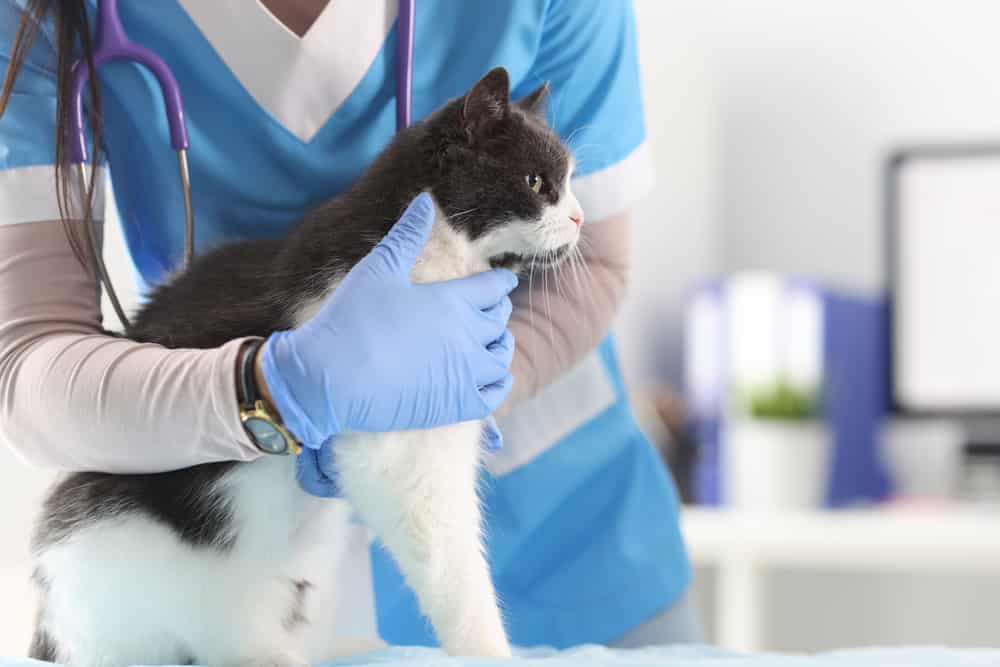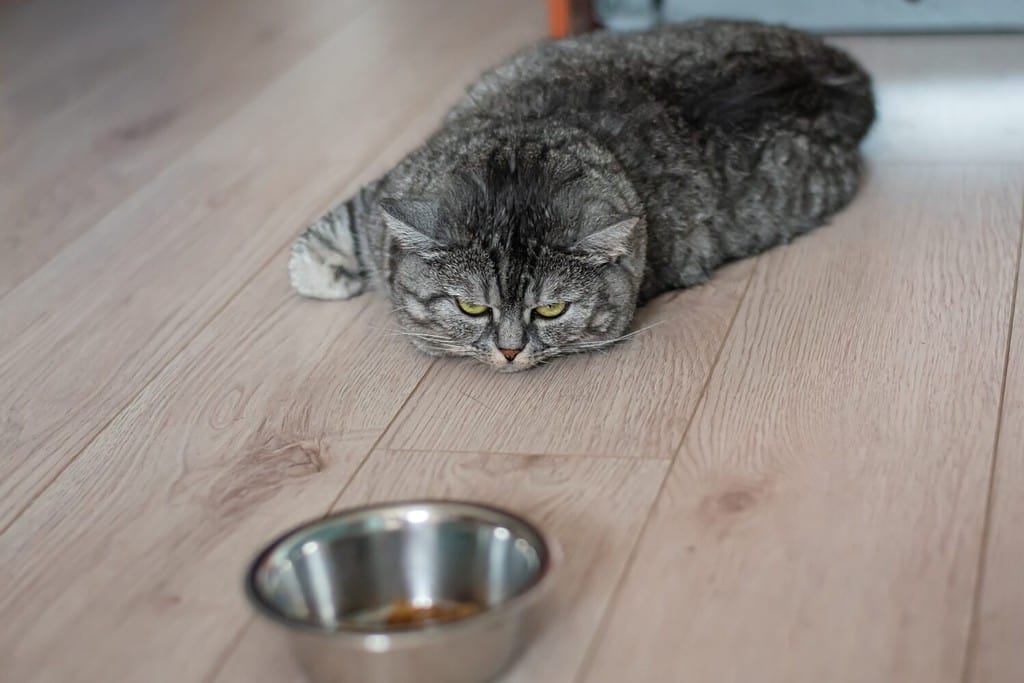You’ve noticed something different about your cat, but you can’t quite put your finger on it. They may be dealing with a parasitic condition that requires immediate attention. Discover four effective ways to get rid of giardia in cats (and pay special attention to the fourth method)! But first, learn what giardia is, how it infects cats, and what kind of symptoms to look out for.
4 Effective Ways to Get Rid of Giardia in Cats Naturally
1. Disinfect the Environment
The very first step to getting rid of giardia in your cat is to completely disinfect your environment. Take your cat and quarantine them in a safe environment away from the space they were inhabiting. Then, get to cleaning and disinfecting. You can do this with a simple solution of diluted chlorine bleach. Take a gallon of water and add a single cup of bleach to it. Then, use this solution to clean your environment. Make sure you let it dry completely because giardia requires moisture to thrive. They’re much more likely to die when the environment is kept dry.
2. Give Your Cat a Bath
The next step is to give your cat a bath. For some cat owners, this is absolutely impossible and so, you may require your veterinarian’s assistance for this. However, if your cat does allow a bath, then make sure to wash them thoroughly, paying special attention to their paws and their behind. Their anal region is where they’re most likely to re-infect themselves so be sure to thoroughly clean that area. The giardia may also be present in your cat’s coat. Therefore, make sure that you scrub them thoroughly.
3. Supplements
Currently, there is not a single drug that can prevent cats from contracting giardia but there are some supplements out there that can help alleviate the symptoms of this condition. Some supplements offer immune support while others are more of a digestive aid. Some supplements include the yucca herb but ultimately, prevention is the best way to keep your cat from getting giardia in the first place. And there’s only one known treatment to completely get rid of giardia in cats.
4. Veterinary Care
That treatment requires veterinary care. Often, your veterinarian can prescribe Metronidazole, which is both effective and affordable. Depending on how severe the symptoms are, your vet may also prescribe additional meds. While some natural solutions are appropriate for use in cats, there are some conditions that require a more direct and effective approach. Giardia is one of them.

Giardia requires veterinary care for diagnosis and treatment.
©H_Ko/Shutterstock.com
What Is Giardia in Cats?
Giardia in cats starts in the intestine but ultimately, it spreads through poop. It could be poop in a litter box that spreads over to another pet (or even a human) or it could be food or water that’s been contaminated by fecal matter. Basically, in the intestine, it is a single-celled organism. Technically, it’s called a protozoan. This is a parasitic condition that requires a host. Giardia refers to the single-celled organism, but the disease created by giardia is referred to as giardiasis.
The tiny parasite settles right into your cat’s intestines, causing a range of symptoms (and sometimes none at all). Left untreated, it can develop into more severe gastrointestinal conditions. Since it can spread to other animals, this is not a cat-specific disease. It’s found in all parts of the world and once a cat is infected, consistent treatment is required. It doesn’t just clear out on its own.
How Does Giardia Infect Cats?
Outdoor cats are more susceptible to ingesting giardia because they are exposed to food sources with fecal matter that may already be infected. Indoor cats are much less likely to get giardia because their food sources are typically packaged or canned before they consume them. However, it is still possible for feces to contaminate various items, including food and water.
When giardia has passed through the intestine, it comes out in the feces in the form of cysts. Cats are infected via the cysts in fecal matter. Your cat doesn’t exactly have to eat poop for this to happen but since cats groom one another, it’s possible that a home with multiple cats can have a case of giardia that quickly spreads if they groom one another’s behinds or if they share the same litter box and groom themselves after.

The simple act of grooming can cause a cat to infect or re-infect itself.
©Bogdan Kurylo/iStock via Getty Images
Once the cat has ingested the cysts contained within the fecal matter, those break down into the single-celled parasites that move into your cat’s intestines. At this stage, the protozoan has replicated and becomes a trophozoite. This is when the parasitic organism is active and feeding. Though similar, they refer to different life stages of the parasitic organism, which leads to giardiasis.
Is Giardia Contagious?
Giardia is incredibly contagious, but it does require ingestion. It’s not an airborne condition but requires your cat to actually ingest infected fecal matter. As mentioned, the simple act of grooming an infected cat or even sharing the same litter box can result in transmission of the condition. Infected food and water also spread giardia.
Considering giardia is so contagious, there are some steps you can take to help sanitize your environment. For instance, ensuring that your cats always have fresh, clean water is a must. Keep their food stored away from your cat’s reach and only take it out when it’s time to feed them. Though it’s recommended there be multiple litter boxes in homes with multiple cats, that is not always possible. Therefore, if you do have cats that share a litter box, make sure that you are cleaning it and disinfecting it regularly.
Symptoms of Giardia in Cats
There are cases when the protozoa may be present in your cat’s intestines, but it doesn’t result in any symptoms. Typically, when your veterinarian tests your cat’s feces, the test for giardia is not included unless they have diarrhea. Diarrhea is one of the most common symptoms experienced when a cat has giardia in its system. It’s not just regular diarrhea your cat gets when you switch their food, for example. This is extremely watery diarrhea that’s severe and persistent.
Additional symptoms that your cat may experience if there is giardia in their system include changes in energy levels. A cat that is usually quite active may suddenly slow down and appear a lot more lethargic with a decrease in energy that’s noticeable. Additionally, a cat with a hearty appetite may suddenly have a decrease in appetite, resulting in weight loss if left untreated.

A cat with giardia may lose its appetite, resulting in weight loss.
©Kitirinya/Shutterstock.com
Your cat may also experience excess gas or vomiting. You may notice that they’re making more trips to the litter box than usual. The issue with a cat that has giardia is that they’re going to constantly groom themselves, which means they’re constantly reinfecting themselves after they use the litter box. For a vet to diagnose this condition, they need to perform a rapid test using a recent stool sample from your cat.
Benefits and Downfalls of Fully Natural Solutions
Ensuring your cat gets proper hydration, has gut health support, and high-quality nutrition is part of keeping them healthy. Cleaning out their litter boxes, giving them baths when needed, and keeping their stress levels at a minimum all work toward a happy, healthy cat. Supplements can help for certain conditions as well, so long as you work with your vet to ensure they don’t interact with any current medications. But natural solutions only go so far. Sometimes, you need a stronger medication to achieve the desired outcome. With giardia, an antibiotic is in order. However, you can always ask your veterinarian about probiotics to help restore your cat’s gut flora after treatment.
The photo featured at the top of this post is © anastas_/1391797125 via Getty Images
Thank you for reading! Have some feedback for us? Contact the AZ Animals editorial team.







